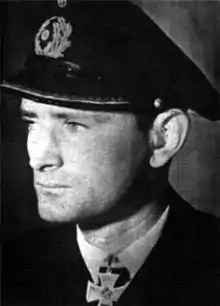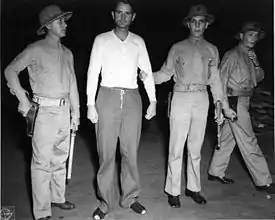Klaus Bargsten
Klaus Bargsten (31 October 1911 – 25 October 2000) was the captain and sole survivor of the sunken U-521. He was a recipient of the Knight's Cross of the Iron Cross.
Klaus Bargsten | |
|---|---|
 Klaus Bargsten | |
| Born | 31 October 1911 Bad Oldesloe |
| Died | 25 October 2000 (aged 88) Bremen |
| Allegiance | |
| Service/ | |
| Years of service | 1936–45 |
| Rank | Kapitänleutnant |
| Unit | 1st U-boat Flotilla 2nd U-boat Flotilla 4th U-boat Flotilla |
| Commands held | U-563, 27 March 1941 – 15 March 1942 U-521, 3 June 1942 – 2 June 1943 |
| Awards | U-boat War Badge Knight's Cross |
Career
U-521 under Bargsten's command was sunk on 2 June 1943 by the United States submarine chaser PC-565 east of Cape Hatteras. Bargsten was the sole survivor.

PC-565 had transported Klaus Bargsten to Norfolk, Virginia for questioning. Bargsten told his captors of several accidents that had befallen U-boats, including the sinking of U-43 at the pier in Lorient in January 1941.
Another accident described by Bargsten was the collision of two U-boats in the Baltic Sea in August or September 1942, during their tactical exercises. One boat was commanded by Oberleutnant zur See Ulrich Pietsch of the 1935 naval term. The other U-boat was commanded by an officer named Friedrichs. Bargsten was under the impression that the latter was U-195. (Note: U-195 has been reported as a 1200-ton U-boat. It has not been possible to identify Friedrichs with any certainty. There are three officers of this name in the German Naval List of 1940. Kapitänleutnant Adolf Friedrichs of the October 1937 naval term, has had a post in the coast artillery.)
The rudder of Pietsch’s boat became jammed, the two boats collided, and both were badly damaged. A second accident occurred to Pietsch’ boat during the working up trials. During torpedo firing exercises, while submerged, Pietsch heard propeller noises in an area in which no other ships were supposed to be present. Suddenly his boat was rammed. On surfacing, he discovered that the ship was none other than the Scharnhorst.
Bargsten said that in Danzig he had seen the Baltic Sea freighter, Morgenrot, lying on her side after being rammed by U-512 under command of Kapitänleutnant Wolfgang Schultze.
The prisoner recounted the story of an artillery duel in June 1942 between a destroyer and U-333 commanded by Kapitänleutnant Peter-Erich Cremer. He said that Cremer was so severely wounded that a plane was sent to take him from the U-boat and rush him to a hospital. (Note: This apparently happened in the Bay of Biscay, probably on a patrol subsequent to the one in which he was rammed by a tanker (June 1942) and brought his U-boat to port completely battered.)(Note 2: This story is somewhat different in the book by Peter Cremer, U-Boat Commander)
In speaking of training and tactics, Bargsten said that the training of prospective U-boat commanders through a "Konfirmandenfahrt" (guest cruise) had been abandoned. He said that captains were now drawn from the ranks of watch officers and that the Agru Front (Active Service Training Group) was considered sufficient additional training.
After Bargsten's interrogation he was held in captivity until his release in 1946. The Kriegsmarine falsely reported the entire crew of U-521 as MIA (Missing in Action).
Ranks and Military Decorations
Ranks
The following is a list of dates for Kptlt. Bargsten's promotions during World War II.
| Date | Rank |
|---|---|
| 1 July 1936 | Fähnrich zur See[1] |
| 1 January 1938 | Oberfähnrich zur See[1] |
| 1 April 1938 | Leutnant zur See[1] |
| 1 October 1939 | Oberleutnant zur See[2] |
| 1 August 1942 | Kapitänleutnant[2] |
Decorations
The following is a list of Kptlt. Bargsten's awards and decorations.
| Date | Decoration |
|---|---|
| 23 July 1940 | Iron Cross (1939) 2nd Class[2] |
| 10 August 1940 | U-boat War Badge (1939)[2] |
| 25 September 1940 | Iron Cross (1939) 1st Class[2] |
| 30 April 1943 | Knight's Cross as Kapitänleutnant and commander of U-521[3][4] |
References
Citations
- Busch & Röll 2003, p. 354.
- Busch & Röll 2003, p. 355.
- Fellgiebel 2000, p. 122.
- Scherzer 2007, p. 202.
Bibliography
- Busch, Rainer; Röll, Hans-Joachim (2003). Der U-Boot-Krieg 1939–1945 — Die Ritterkreuzträger der U-Boot-Waffe von September 1939 bis Mai 1945 [The U-Boat War 1939–1945 — The Knight's Cross Bearers of the U-Boat Force from September 1939 to May 1945] (in German). Hamburg, Berlin, Bonn Germany: Verlag E.S. Mittler & Sohn. ISBN 978-3-8132-0515-2.CS1 maint: ref=harv (link)
- Fellgiebel, Walther-Peer (2000) [1986]. Die Träger des Ritterkreuzes des Eisernen Kreuzes 1939–1945 — Die Inhaber der höchsten Auszeichnung des Zweiten Weltkrieges aller Wehrmachtteile [The Bearers of the Knight's Cross of the Iron Cross 1939–1945 — The Owners of the Highest Award of the Second World War of all Wehrmacht Branches] (in German). Friedberg, Germany: Podzun-Pallas. ISBN 978-3-7909-0284-6.CS1 maint: ref=harv (link)
- Gentile, Gary (1989). Track of the Gray Wolf. Avon Books. ISBN 0-380-75685-4.
- Römer, Felix (2012). Kameraden. Die Wehrmacht von innen [Comrades. An Inner View of the Wehrmacht] (in German). Munich, Germany: Piper. ISBN 978-3-492-05540-6.
- Scherzer, Veit (2007). Die Ritterkreuzträger 1939–1945 Die Inhaber des Ritterkreuzes des Eisernen Kreuzes 1939 von Heer, Luftwaffe, Kriegsmarine, Waffen-SS, Volkssturm sowie mit Deutschland verbündeter Streitkräfte nach den Unterlagen des Bundesarchives [The Knight's Cross Bearers 1939–1945 The Holders of the Knight's Cross of the Iron Cross 1939 by Army, Air Force, Navy, Waffen-SS, Volkssturm and Allied Forces with Germany According to the Documents of the Federal Archives] (in German). Jena, Germany: Scherzers Militaer-Verlag. ISBN 978-3-938845-17-2.CS1 maint: ref=harv (link)
